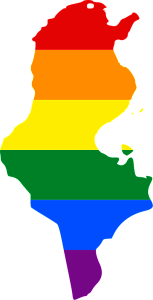The 'Tests of Shame' and the 'Homosexual question': Tunisia’s greatest challenge to democracy?
On September 22, a 22-year-old student named Marwan was sentenced under Article 230 of the Tunisian Penal Code to one year in prison for engaging in sodomy. Members of civil society and human rights organizations have denounced the use of Article 230 and have called for its repeal, considering it to be contrary to the protection of a “person’s dignity and physical integrity” as guaranteed by Article 23 of the Constitution. The controversy has sparked contestation on social networks through the use of hashtags: #لا_لفحوصات_العار (No to the shame tests) and #لا_للفصل_230 (No to Article 230).

The most controversial element, however, remains the overall mystery surrounding the case. Sources from the Ministry of the Interior have asserted to Business News that Marwan was part of a murder investigation and was allegedly a male prostitute. The murder victim was supposedly one of Marwan’s clients, and police used this claim to justify holding the young man in custody for six days and performing an anal test to obtain proof of his involvement.
According to the Ministry of the Interior spokesperson Walid Louguini, the anal examination was performed with the accused’s consent. “It was he who asked for the examination,” added Louguini. However, his lawyer, Fadoua Breham, reiterated that Marwan was only a student and that the “Consent of [her] client was not obtained.” She declared that they would appeal the decision and sue the Ministry of the Interior and Business News for defamation.
A 2013 Pew Research Center poll found that Tunisia has one of the lowest acceptance rate of homosexuality in the world (6%), and Amnesty International has documented numerous cases of arrests and prosecutions of homosexuals between 2009 and 2014. It seems likely that Marwan may have been coerced into undergoing the invasive test, and he may not be the only person who has been forced to do so.
In the wake of recent terrorist attacks, western countries have increased their support to Tunisia. The United States has doubled the amount of bilateral assistance to Tunisia and has made Tunisia its newest “major non-NATO” ally, allowing it to become a large recipient of U.S. military equipment and assistance. Similarly, the European Union has announced greater counter-terrorism, economic, and judicial cooperation.
Since the Jasmine Revolution of 2011, Tunisia has managed to organize free and fair elections, has witnessed a peaceful transfer of power between the Islamist Ennahda party and the secular Nidaa Tounes, and has created a new constitution guaranteeing gender equality and freedom of expression while rejecting religious extremism. As it leans closer towards the West through its tighter links with the United States, the European Union, and NATO, the depenalization of homosexuality would go a long way in signaling Tunisia’s determination in progressing toward full democracy.
